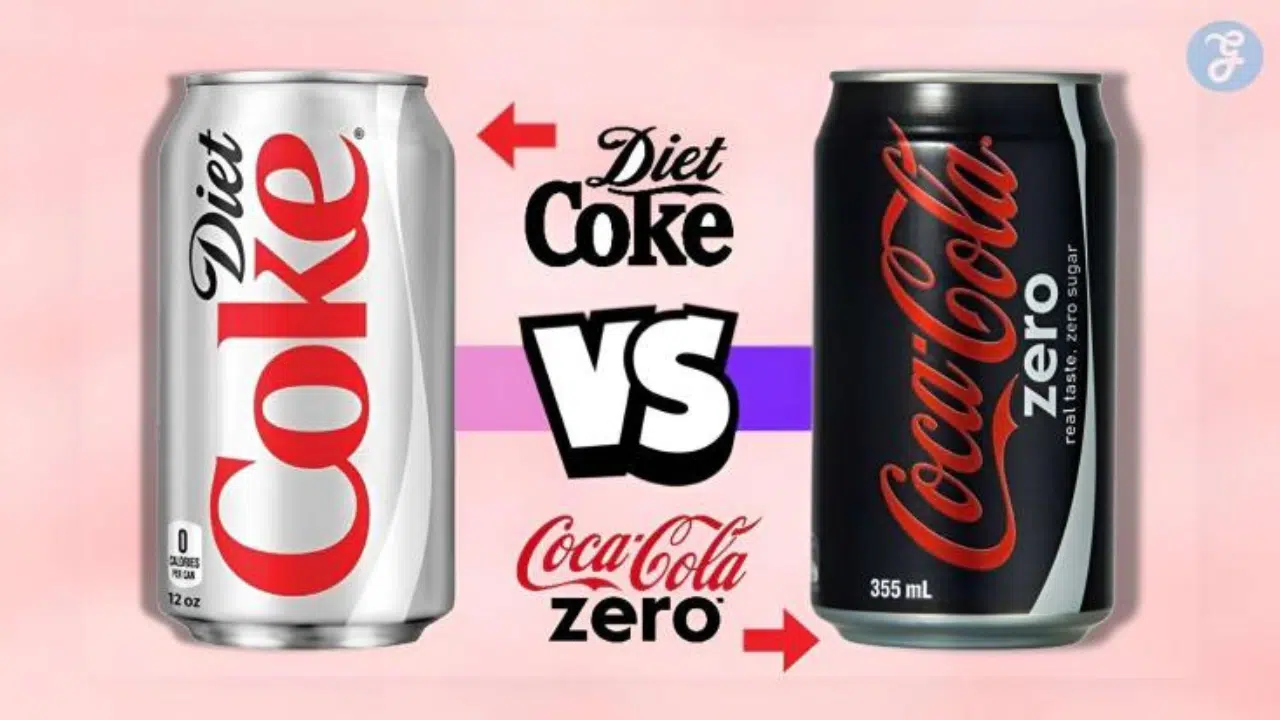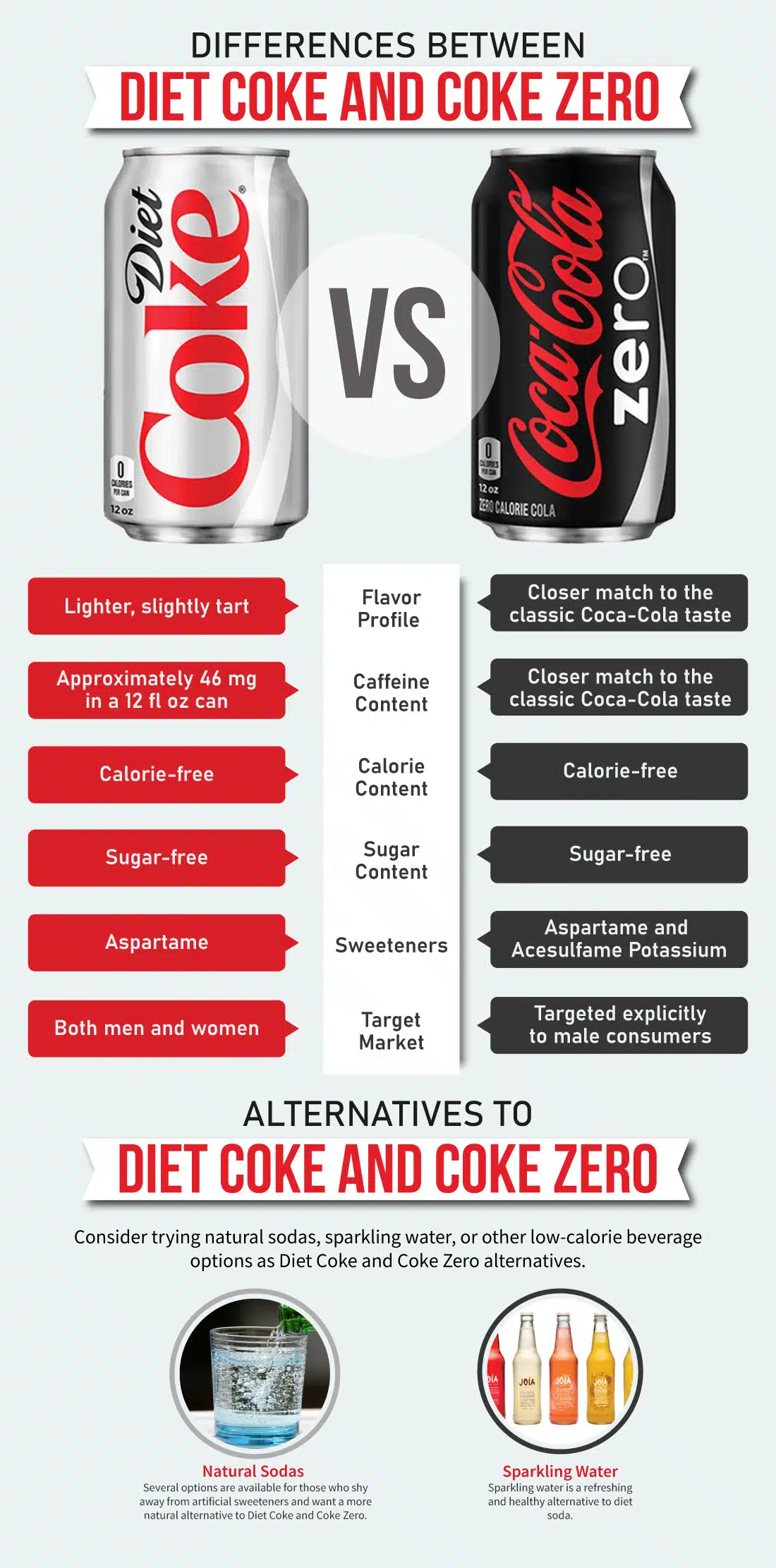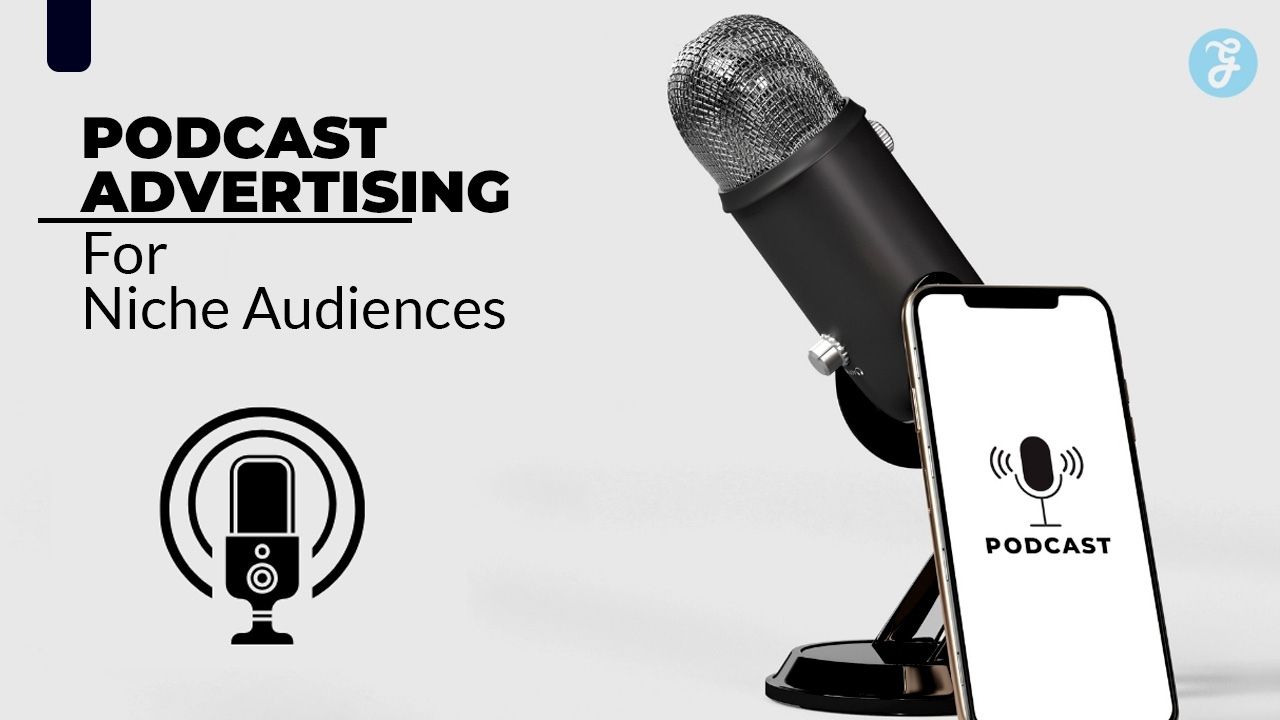Listen to the Podcast:
Are you a fan of low-calorie soft drinks but can’t decide between Diet Coke and Coke Zero? You’re not alone! The debate over which is better, diet Coke vs Coke Zero for you, has been ongoing since the cola giants first introduced their zero-sugar alternatives.
This blog post dives into the key differences between these two popular beverages, compares their nutritional info and health impacts, explore expert opinions on which drink comes out on top and offers some alternative options.
Key Takeaways
Diet Coke and Coke Zero offer a calorie-free alternative to regular soda, with unique sweetening agents and flavor profiles catering to different target markets.
Both drinks contain artificial sweeteners like aspartame, which don’t raise blood sugar levels but may have some potential health risks when consumed in excess.
When choosing between Diet Coke and Coke Zero, you must consider your needs and preferences regarding caffeine content, sodium intake, weight management goals, cardiovascular health concerns, and overall nutritional value.
Ultimately, moderation is key when consuming any soft drink or beverage – opting for healthier alternatives like natural sodas or sparkling water can help ensure you’re making more nutritious choices for your body.
Understanding the Differences Between Diet Coke and Coke Zero
Diet Coke and Coke Zero differ in their sweeteners, flavor profiles, target market, and caffeine content. Below we’ll get them in a table and then with detail.
| Aspect | Diet Coke | Coke Zero |
|---|---|---|
| Sweeteners | Aspartame | Aspartame and Acesulfame Potassium |
| Flavor Profile | Lighter, slightly tart | Closer match to the classic Coca-Cola taste |
| Target Market | Broader appeal, both men and women seeking healthier options without sacrificing taste | Targeted explicitly to male consumers who desire a low-calorie soda with a classic Coca-Cola flavor. |
| Caffeine Content | Approximately 46 mg in a 12 fl oz can | Approximately 34 mg in a 12 fl oz can |
| Calorie Content | Calorie-free | Calorie-free |
| Sugar Content | Sugar-free | Sugar-free |
Sweeteners Used
The main distinction between Diet Coke and Coke Zero lies in the sweeteners used in their formulations. While both beverages are calorie-free alternatives to regular Coca-Cola, they offer unique flavor profiles due to their different sweetening agents.
On the other hand, Coke Zero combines aspartame with another calorie-free sweetener called acesulfame potassium. This blend of two artificial sweeteners provides an even closer match to the classic Coca-Cola taste that many people love.
Flavor Profile
The flavor profile of Diet Coke and Coke Zero is one key difference that sets them apart in the ongoing debate between diet coke vs coke zero. While both beverages are designed as calorie-free alternatives to regular Coca-Cola, they each have unique tastes catered toward different target markets.
Coke Zero was developed to replicate classic Coke’s iconic taste without calories and sugar content. Hence, it appeals more to those who enjoy regular Coca-Cola but wish to reduce sugar and caloric intake.
On the other hand, Diet Coke offers a distinct flavor profile compared to its regular counterpart – featuring lighter notes and a slightly tart taste. This makes it a preferred choice for those looking for an entirely new experience in their low-calorie soft drink options while keeping some essence of classic cola flavors.
Target Market
The target market for Diet Coke and Coke Zero varies, reflecting the distinct branding and marketing approaches employed by the Coca-Cola Company. Diet Coke, introduced in 1982 as a sugar-free alternative to regular Coca-Cola, initially targeted men and women seeking healthier beverage options without sacrificing taste.
In contrast, Coke Zero was launched in 2005 with a different strategy – catering specifically to male consumers who desired a low-calorie soda that closely resembled the flavor of classic Coca-Cola.
The masculine packaging, bold font choice on labels, and advertising campaigns focusing on sports events all contributed to this perception. While both sodas offer similar benefits in reduced sugar intake -18K- it’s essential to recognize their contrasting target markets as male-centric for Coke Zero vs. Diet Coke’s initial broader appeal -27K.
Caffeine Content
Both Diet Coke and Coke Zero contain caffeine, a stimulant that can increase energy and alertness. However, there is a slight difference between the two regarding caffeine content.
In a 12-fluid-ounce can of Diet Coke, you’ll find about 46 milligrams of caffeine. On the other hand, in a 12-fluid-ounce can of Coke Zero, there are only about 34 milligrams of caffeine.
While consuming moderate amounts of caffeine may have benefits like increased mental focus and improved physical performance, too much consumption may lead to side effects such as anxiety, jitteriness, or insomnia.
Diet Coke vs Coke Zero: Nutritional Information and Health Impacts
Discover the detailed nutritional information and health impacts of Diet Coke vs. Coke Zero.
Calories
Regarding calories, Diet Coke and Coke Zero are similar because they contain zero calories. Due to the sugar content, regular soda can have up to 150-200 calories per serving.
However, artificial sweeteners like those found in Diet Coke and Coke Zero allow people to satisfy their cravings without consuming excess calories. This makes them popular choices for people looking to maintain a healthy weight or reduce calorie consumption without sacrificing taste.
To avoid empty calories that contribute nothing nutritionally, Diet Coke and Coke Zero offer an excellent sugar-free alternative to traditional sodas.
Sugar Content
Diet Coke and Coke Zero have no sugar, making them popular for those watching their calorie intake. On the other hand, regular soda contains a significant amount of sugar that can lead to weight gain and other health problems if consumed in excess.
For example, one 12-ounce regular Coca-Cola has 39 grams of added sugar, while Diet Coke and Coke Zero have zero. This makes them an excellent choice for those who want something sweet without excess calories or sugar content.
Sodium Content
Diet Coke and Coke Zero have the same amount of sodium, 70 milligrams per serving. However, the percentage of daily value differs between the two beverages.
For Coke Zero, it provides only 1% of the daily value for sodium, while for Diet Coke, it provides a hefty 33%.
It’s worth noting that both drinks provide less than 4kJ energy and less than 40mg of sodium per cup. So whether you opt for Diet Coke or Coke Zero depends on your health goals and individual needs.
Other Nutrients
In addition to calories, sugar, and sodium content, examining other nutrients in Diet Coke vs. Coke Zero is essential. Both drinks contain vitamins and minerals like phosphorus, potassium, and magnesium, but in tiny amounts that don’t significantly contribute to your daily nutrient intake.
If you’re looking for a more nutritious beverage choice, consider natural fruit juices or teas instead of highly processed sodas – this can help increase antioxidants (compounds that help protect your cells against damage caused by free radicals).
If sticking with soda is essential for you to- try switching to seltzer water with fresh fruit slices or using stevia/monk fruit/sucralose-based syrups for flavor if sweetness is desired rather than the artificial sweeteners found in traditional diet sodas.
Weight Management
Choosing Diet Coke and Coke Zero can be challenging if you’re trying to watch your weight. These beverages are marketed as low or zero-calorie options that won’t interfere with your goals.
While they don’t contain sugar, it’s important to note that excessive sugary drinks can lead to weight gain and obesity.
Studies have shown mixed results regarding the impact of diet soda on weight management. Some research suggests that people who switch from regular soda to diet soda may still consume more calories overall. In contrast, others suggest diet soda consumption doesn’t necessarily cause weight gain.
It’s worth noting, however, that some studies indicate a positive association between soft drink consumption (including sugar-free) and increased risk for overweight or obesity.
Cardiovascular Health
Consuming sugary drinks like regular soda can raise blood pressure and increase the risk of heart disease. On the other hand, diet soft drinks have been linked to an increased risk of stroke, coronary heart disease, and death in women who consume more than two per day.
Opting for soft or zero-calorie beverages like Coke Zero or Diet Coke can be an excellent choice to reduce sugar intake. The artificial sweeteners in these drinks may not directly impact cardiovascular health, but reducing excessive sugar consumption can indirectly benefit your heart health.
Blood Sugar Regulation
Diet Coke and Coke Zero are marketed toward those who want to watch their sugar intake. Artificial sweeteners in these drinks do not raise blood sugar levels, unlike regular soda or energy drinks.
It’s important to note that although artificial sweeteners don’t contain calories or carbohydrates, they can still trigger insulin secretion in some individuals. This means that even though there is no actual sugar present in the drink, drinking too much diet coke or coke zero could potentially cause erratic blood sugar levels for people with diabetes or other conditions affected by glucose metabolism.
Dental Health
Drinking soda, even sugar-free ones like Diet Coke and Coke Zero, can negatively affect dental health. The high acidity in these drinks erodes tooth enamel over time, making teeth more susceptible to decay and cavities.
A study published in the Journal of Dentistry found that sodas’ pH levels can significantly damage tooth enamel within five minutes of exposure.
To protect your dental health while still enjoying fizzy beverages, it’s recommended to drink soda through a straw to minimize contact with teeth or rinse your mouth with water after drinking.
Potential Risks and Benefits
While Diet Coke and Coke Zero offer a low-calorie alternative to traditional soda, they come with their potential risks and benefits. Some studies suggest that artificial sweeteners in diet sodas can lead to weight gain and other health issues such as high blood pressure, metabolic syndrome, and cardiovascular disease.
Additionally, research has linked diet soda consumption to an increased risk for type 2 diabetes. On the other hand, drinking calorie-free beverages like Diet Coke or Coke Zero may aid in weight loss or maintenance by reducing overall caloric intake.
Expert Opinions on Diet Coke vs. Coke Zero
Experts agree that Diet Coke and Coke Zero have similarities and differences in ingredients, health effects, and taste.
Similarities and Differences in Ingredients
Diet Coke and Coke Zero have a similar ingredient base, with carbonated water, caramel color, phosphoric acid, potassium benzoate, and natural flavors all appearing.
However, the main difference lies in their sweetening agents.
Despite this fundamental difference in their ingredients’ makeup, they are still very similar drinks with low-calorie content. Experts agree that there is little to choose between these two options when it comes to choosing one over the other for health reasons.
Health Effects
Diet Coke and Coke Zero are low in calories, sugar, and carbohydrates, making them a good choice for weight management. A can of soda contains 0 grams of sugar and only 1 calorie.
However, there has been some controversy over the safety of artificial sweeteners like aspartame used in Diet Coke and both aspartame and acesulfame potassium used in Coke Zero.
While the FDA considers these sweeteners safe for consumption at current levels, some studies have linked frequent consumption to an increased risk of specific health issues such as metabolic syndrome or depression.
Taste Tests and Preferences
Expert taste tests have found that there are noticeable differences in flavor between Diet Coke and Coke Zero. Many consumers find Diet Coke slightly sweeter, while Coke Zero is closer to the classic Coca-Cola flavor.
Some people prefer one, but it ultimately comes down to personal preference.
It’s also important to note that taste preferences can change over time, so if you haven’t tried either drink in a while or are new to them, don’t be afraid to try them and see which one you enjoy more.
Read also: Dinks to Keep Your Skin Healthy in Summer
Which One is the Healthier Choice?
When it comes to Diet Coke vs. coke zero
Personal Preferences
Personal preferences play a significant role when choosing between Diet Coke and Coke Zero. Some people may prefer the taste of Diet Coke with its distinct caramel flavor, while others may find the smooth finish of Coke Zero more appealing.
Additionally, some individuals may have a preference for caffeine content. If you need an energy boost throughout the day, you might lean towards Coke Zero, with slightly higher caffeine content than Diet Coke.
However, if you’re sensitive to caffeine or trying to limit your intake altogether, then Diet Coke could be a better option.
Considerations for Health and Nutrition
When it comes to choosing between Diet Coke and Coke Zero, health and nutrition should be taken into account. Both beverages are low in calories and sugar-free, making them tempting options for those trying to maintain a healthy diet or manage weight.
However, both drinks contain artificial sweeteners like aspartame that have been linked to potential adverse health effects.
It’s important to note that personal preferences play a role in choosing between the two. Some people prefer the taste of Diet Coke over Coke Zero or vice versa.
Both drinks also have different flavor profiles due to using different sweeteners, which may affect taste preferences.
You may like to read: List of 5 Drinks That Helps You Live Longer
Alternatives to Diet Coke and Coke Zero
Consider trying natural sodas, sparkling water, or other low-calorie beverage options as Diet Coke and Coke Zero alternatives.
Natural Sodas
Several options are available for those who shy away from artificial sweeteners and want a more natural alternative to Diet Coke and Coke Zero. Natural sodas made with actual sugars like cane sugar or honey can offer a refreshing taste without the added calories of regular soda.
Another option for low-calorie beverages is sparkling water. These carbonated waters come in various flavors like grapefruit and lime and have no added sugars or sweeteners.
Ultimately, whether you choose Diet Coke, Coke Zero, or any other beverage depends on your personal preferences and dietary needs. While natural sodas may seem like the healthier choice compared to artificially sweetened drinks like Diet Coke or Coke Zero because they contain natural sugar instead of chemicals – it does not mean they lack calories.
Sparkling Water
Sparkling water is a refreshing and healthy alternative to diet soda. Unlike diet drinks that contain sugar and aspartame, sparkling water is free of calories, sugar, and other artificial sweeteners.
It’s also an excellent option for people who want to reduce their sugar intake or lose weight. Drinking sparkling water can help you stay hydrated while feeling fuller for extended periods.
Plus, it contains no harmful chemicals often found in sugary sodas. For those looking for flavor options, many brands offer flavored sparkling waters without added sugars or sweeteners, making them a delicious and guilt-free beverage choice.
Other Low-Calorie Beverage Options
If you’re looking for healthy, low-calorie beverage alternatives to Diet Coke and Coke Zero, there are many options available. Natural sodas made with organic ingredients and natural sweeteners are an excellent choice for those who want something fizzy without regular soda’s artificial flavors and colors.
Other low-calorie beverage options like unsweetened tea, coconut water, and vegetable juice blends offer nutritional benefits without added sugar.
Many people find drinking plain water with lemon or cucumber slices easy to stay hydrated while adding flavor.
FAQs
If you’re still wondering about the differences between Diet Coke and Coke Zero, here are some frequently asked questions that might help:
Are Diet Coke and Coke Zero the same thing?
No, they are not. While both are sugar-free and calorie-free sodas, they use different sweeteners and have varying flavor profiles.
Is Diet Coke or Coke Zero better for weight loss?
Both drinks can be a part of a weight loss diet as they are low in calories and sugar. However, it ultimately depends on personal preferences.
Can drinking too much Diet Coke or Coke Zero harm your health?
While there is no conclusive evidence that consuming moderate amounts of artificial sweeteners is harmful, excessive consumption may lead to potential health risks such as headaches, digestive issues, and even cancer in rare cases.
How much caffeine do Diet Coke and Coke Zero contain?
Diet Coke contains 46mg of caffeine per 12 oz serving, while Coca-Cola Zero Sugar (formerly Coke Zero) has slightly more at 54mg per 12 oz serving.
Do Diet Coke and Coke Zero have any nutritional value?
Both drinks do not provide any significant nutritional value apart from hydration due to their zero-calorie content.
Are there any alternatives to these sodas for those who want to reduce sugar intake?
Many other low-calorie beverage options, like natural sodas, sparkling water, unsweetened tea, and coffee, are available.
Which one should I choose – Diet Coke or Coke Zero?
Ultimately it comes down to personal preference, but both options offer similar health benefits with slight variations in taste and ingredients. Choosing whichever suits your taste buds and dietary needs best is best!
What are the main differences between Diet Coke and Coke Zero?
While both are sugar-free alternatives to regular Coca-Cola, Coke Zero uses a different blend of artificial sweeteners, giving it a slightly different taste than Diet Coke. Diet Coke has been around longer and contains caffeine, while Coke Zero does not.
Which is healthier: Diet Coke or Coke Zero?
Both drinks have low-calorie counts and no added sugars, so they can be considered healthier than regular soda options. However, it is essential to note that both contain artificial sweeteners, which some studies suggest may have adverse health effects in the long run if consumed excessively.
Will drinking either of these sodas help me lose weight?
While neither drink will contribute calories towards your diet, they also do not directly lead to weight loss on their own either. Maintaining a healthy diet with balanced nutrients and being physically active regularly is crucial for sustainable weight loss.
Can I drink these sodas if I am diabetic?
Diet sodas like Diet Coke or Coke Zero contain zero grams of sugar per serving. They can be suitable for people with diabetes who must carefully monitor their blood glucose levels as part of their dietary requirements. However, checking with your doctor beforehand is always recommended before making any substantial changes in your diet when managing diabetes symptoms effectively requires proper medical supervision.
Wrapping Up
In the battle of Diet Coke vs. Coke Zero, it’s clear that both drinks are low-calorie options with similar ingredients. While there may be slight differences in flavor and caffeine content, there is no significant nutritional disparity between the two.
Ultimately, whether you prefer the taste of Diet Coke or Coke Zero comes down to personal preference. However, if you’re looking for a healthier alternative to soda altogether, consider trying natural sodas or sparkling water instead.
Disclaimer: This content is for informational purposes only and does not replace professional medical advice, diagnosis, or treatment. This information is not comprehensive and should not be used to make health or well-being decisions. Consult a qualified healthcare professional with questions about a medical condition, treatment options, or health regimen. This website or the content should never replace professional medical advice.











































